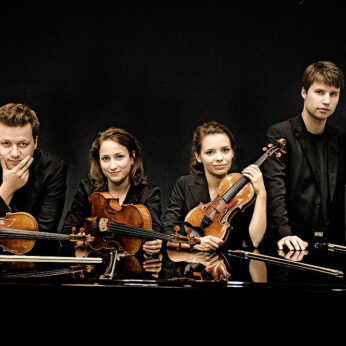Composer: Wolfgang Amadeus Mozart (b. 1756 - d. 1791)
Performance date: 27/06/2023
Venue: Bantry House
Composition Year: 1770
Duration: 00:15:49
Recording Engineer: Tom Norton, RTÉ
Instrumentation: 2vn, va, vc
Instrumentation Category:String Quartet
Artists:
Armida Quartet (Martin Funda, Johanna Staemmler [violins] Teresa Schwamm [viola], Peter-Philipp Staemmler [cello]) -
[String Quartet]

Quartet in G major K.80 [1770]
1. Adagio
2. Allegro
3. Minuetto
4. Rondeau
Seven years ago the Armida Quartet embarked on a huge project not only to record all Mozart’s string quartets, but also to work with the music publishers, G.Henle, on a new complete edition of these glorious works. This important project concluded this year with the publication of the new scores and the seven CD set of recordings. The major issue for the editor is the difference between the autograph score and the first edition published in the composer’s lifetime. Mozart’s early quartets all survive in manuscript and, as Mozart’s father refused to have them published, describing them as mere finger exercises, there is no conflict over his intentions. There are however question marks about paternal involvement.
In November 1769 the Mozart family left Salzburg for their first Italian tour with not only the blessing, but also the financial support of Archbishop Siegmund. He was the predecessor of Archbishop Colloredo, who caused so much grief for the Mozart family. His first string quartet, K.80, was written at Lodi just outside Milan on the way to Parma in March 1770; Mozart was just 14. It began as a slender three-movement work, a fourth movement being added a few years later. It betrays a touch of Salzburg folk melody and the more immediate influence of the north Italian masters, Boccherini and Sammartini. The latter was based in Milan and his subtle instrumental style – light, gallant and buffo – must have affected the young Mozart. Throughout we cannot but be delighted at the young Mozart’s wit and joie de vivre.
Copyright © 2025 West Cork Music. All rights reserved.
Designed and developed by Matrix Internet